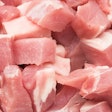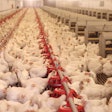Optimism in the poultry industry was at a historic low less than one year ago. Since then, confidence has risen above normative levels as key factors have stabilized (for now).
The Overall Index for the WATT/Rennier Poultry Confidence Index for the first quarter of 2013 now stands at 113.1 (1996=100), up from 72.8 the previous quarter. The Expectations Index rose to 107 from 60.1, while the Present Situation Index increased to 117.2 from 81.3
In addition, all five sub-indices showed similar increases, while four of the five eclipsed the 100-point normative level. The exception was the Present Opportunities Index, which stood at 87.7.
However, some respondents noted that even though the industry is not producing any new jobs there was “plenty of opportunity for college-trained individuals to replace those baby boomers that are retiring.”
While the Poultry Confidence Index was on the rise, the Consumer Confidence Index was falling. The payroll tax increase that commenced in January – resulting in less take-home pay – led to paycheck shock. It may take awhile for consumers to recover.
Our poultry respondents were optimistic that:
- Grain prices have stabilized
- Beef prices will spike
- Exports will hold steady or improve
- Integrators will cut or at least maintain production levels.
Animal feed costs remain problematic
Two of these factors are on shaky grounds.
Thomas Elam, president of FarmEcon LLC, foresees huge animal feed cost risks over the next two years. There is a massive shortage of corn, and soybean stocks are at record-low inventory levels. As if that wasn’t enough, farmers could potentially plant fewer acres of corn due to a continuing drought. The ethanol mandate aggravates these conditions.
Rather than declining, production levels have increased during early 2013. Broiler sets are up 1 percent from a year ago and the USDA is predicting total pounds of broiler meat for 2013 will likewise be up 1 percent over 2012.
As predicted by Heather Jones of BB&T Capital Markets, it appears that higher-than-expected pricing coupled with softer-than-expected animal feed costs have kept poultry integrators from pulling the trigger on cutbacks.
Less optimism in turkey industry
Those in the turkey industry were less optimistic than their broiler counterparts. The aforementioned Thomas Elam – speaking at the 2013 National Turkey Federation convention – said 2013 could be “the worst year in the [turkey] industry.” Falling prices due to a weakness in the breast-meat markets, along with stable production forecasts and higher animal feed costs, “could be a real disaster.”
Optimism is on the rise in the poultry industry fueled by stable grain prices and a robust export market. However, either of these could change rapidly, leaving the industry in a pinch. The turkey industry may fare less well, as prices are expected to decline.
|
WATT/Rennier Poultry Confidence Index: Overall Index* |
|
|
First quarter 2013 |
113.1 |
|
Fourth quarter 2012 |
72.8 |
|
*(1996=100) |
|












